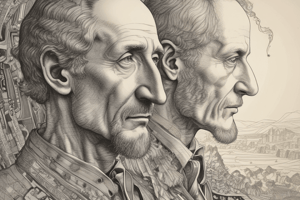Podcast
Questions and Answers
What characterized John Stuart Mill's childhood education?
What characterized John Stuart Mill's childhood education?
- He was allowed to play regularly.
- He was tutored by his father, focusing on hard work and rationality. (correct)
- He had a typical social upbringing.
- He was encouraged to express his emotions.
What significant event occurred in Mill's life at the age of 17?
What significant event occurred in Mill's life at the age of 17?
- He met Harriet Taylor.
- He published his first book.
- He started working as a clerk for the East India Company. (correct)
- He became a member of Parliament.
How did Mill's relationship with Harriet Taylor evolve over time?
How did Mill's relationship with Harriet Taylor evolve over time?
- They had a traditional marriage from the start.
- They initially had a platonic yet deeply emotional connection. (correct)
- It remained strictly platonic without emotional depth.
- They lived separately until her death.
What was the focus of Mill's work, The Subjection of Women?
What was the focus of Mill's work, The Subjection of Women?
What mental crisis did Mill experience in his early twenties?
What mental crisis did Mill experience in his early twenties?
Which of the following actions is NOT associated with Mill's political activism?
Which of the following actions is NOT associated with Mill's political activism?
What did contemporaries observe about Mill's self-description as a 'logical, dry, hard machine'?
What did contemporaries observe about Mill's self-description as a 'logical, dry, hard machine'?
In which year did Mill die?
In which year did Mill die?
Flashcards are hidden until you start studying
Study Notes
Early Life and Education
- Mill's childhood was centered on rigorous academics and limited play.
- His father, James Mill, served as his tutor, prioritizing logic and reason above emotions.
- Mill’s education fostered a rational, but emotionally stifled personality, which was evident in his youth.
Career and Early Crises
- At 17, Mill began his career as a clerk in the East India Company.
- He endured a severe mental crisis in his early twenties, marked by depression, feelings of inadequacy, and an inability to work.
- This period was a turning point; Mill recovered, found a renewed appreciation for emotions, and acknowledged the importance of both rationality and irrationality.
Meeting Harriet Taylor
- Mill met Harriet Taylor in 1830, and their connection drastically changed Mill's outlook.
- Despite her being married with children, their relationship held significant emotional significance, with an emphasis on intellectuality and emotional depth.
- This relationship lasted until Taylor's death in 1858, and they later married in 1849.
Works and Political Activism
- Mill authored The Subjection of Women in 1869, a prominent work advocating for women's rights and equality.
- He was a vocal proponent of women's suffrage and a member of the British Parliament, translating his ideas into actions.
- Mill publicly denounced slavery during the American Civil War, aligning himself with abolitionist movements.
Later Life and Legacy
- Mill continued to be a prominent intellectual figure, offering viewpoints on various contemporary issues.
- He passed away in 1873, leaving behind a legacy as a prominent liberal thinker.
Studying That Suits You
Use AI to generate personalized quizzes and flashcards to suit your learning preferences.





